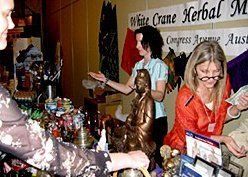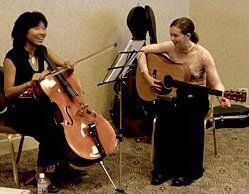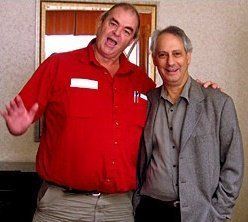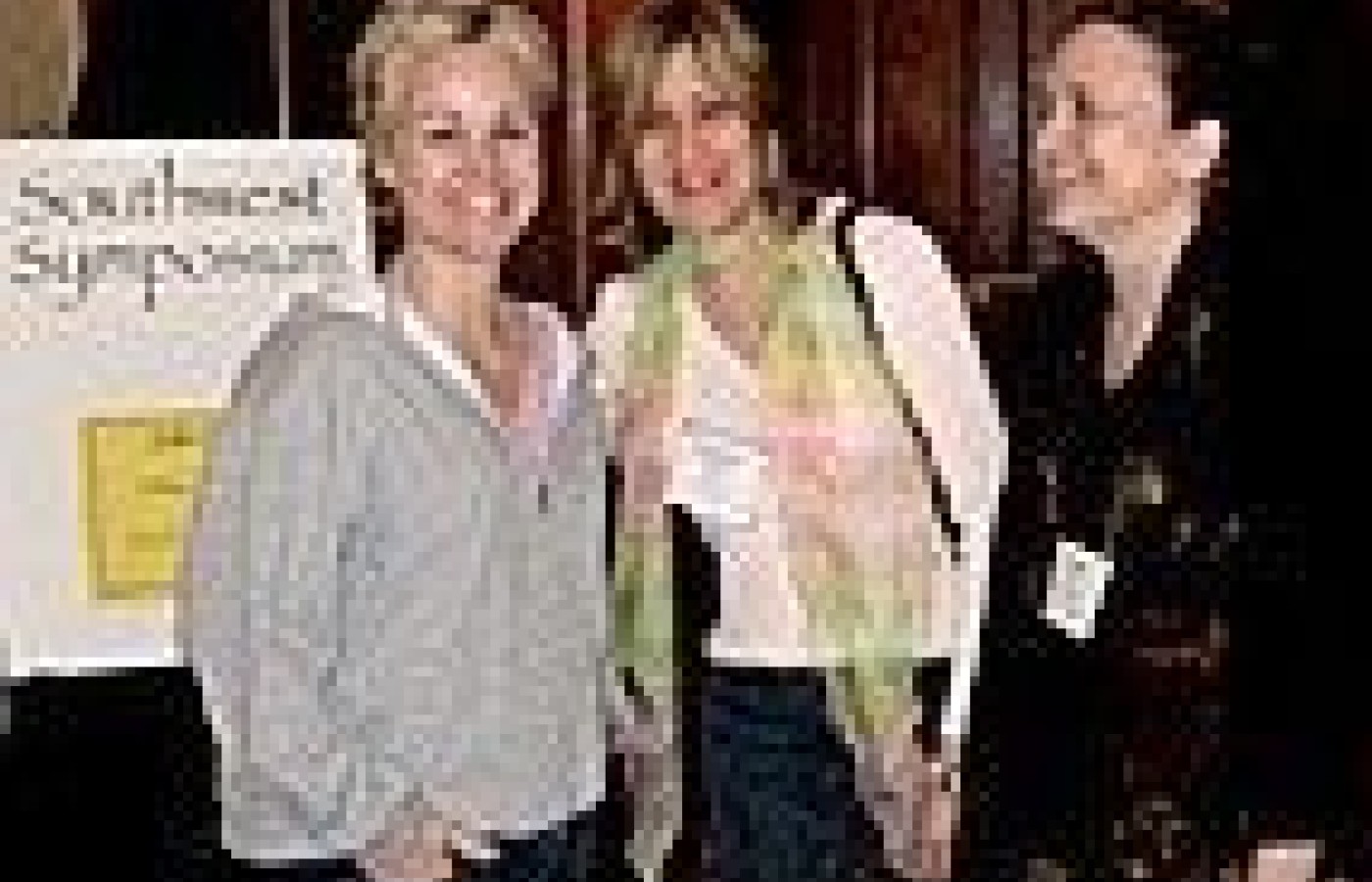The most important relationship I seek to nurture in the treatment room is the one a patient has with their own body. We live in a culture that teaches us to override pain, defer to outside authority, and push through discomfort. Patients often arrive hoping I can “fix” them, but the truth is, we can’t do the work for them. We can offer guidance, insight and support, but healing requires their full participation.
The 2005 Southwest Symposium: Discovering and Integrating Qi, Deep in the Heart of Texas
Sunshine, flowers and qi were all in full bloom over the weekend of March 11-13, 2005 for this year's Southwest Symposium, held at the Omni Hotel Southpark in Austin, Texas. Over 250 participants came together for the meeting, titled "Integrating Qi."

The symposium is the premier acupuncture and Oriental medicine forum in the Southwest. Sponsored by a collaboration of the University of Texas Health Science Center-San Antonio's continuing education program and the Academy of Oriental Medicine at Austin, the symposium's goal is to continually raise the standards of educational excellence by offering a variety of topics, presented by teachers with years of clinical experience, many of whom are published authors and international speakers. In addition to acupuncturists, the organizers included special sessions designed to educate health care professionals about the benefits of choosing Oriental medicine when seeking an integrative approach to patient wellness.
"AOMA and UT are dedicated to quality education and service to the community. The symposium is in keeping with that basic philosophy. Your time is valuable, and we acknowledge your commitment to excellence in the field," said Rosalie Tierney-Gumaer, who, along with AOMA's Linda Fontaine, served as one of the symposium's co-chairs.
This year's program featured 12 speakers from around the country, including:
Mark Blumenthal, senior editor of the American Botanical Council's Clinical Guide to Herbs, and founder and executive director of the American Botanical Council. On Friday, March 11, Mr. Blumenthal spoke about the clinical use of Western herbs. Drawing on his year's of experience, this course will help practitioners to safely and effectively recommend the appropriate herbal supplements for their patients.
Honora Lee Wolfe, LAc, noted speaker, acupuncturist and author of Points for Profit: The Essential Guide to Practice Success for Acupuncturists. Also speaking on Friday, Ms. Wolfe gave the audience new ways to find, convince, educate and keep patients coming back.
Allen Cline, LAc, acupuncturist and owner of Turtle Dragon Health Services. In this popular session, Mr. Cline demonstrated how Western medicine, conventional medicine and traditional Chinese medicine complement each other.

Saturday morning brought some early morning tai chi sessions to the Omni Hotel poolside, led by Roger Jahnke, OMD, LAc, one of the day's speakers. Later, during an all-day session, Dr. Jahnke brought new insights into integrating qigong into a clinical practice. He taught strategies on implementing medical qigong as a way of enhancing patient outcomes and well-being.
Other speakers on Saturday included:
Victor S. Sierpina, MD. Dr. Sierpina is Associate Professor of Family Medicine at the University of Texas Medical Branch (UTMB) in Galveston. He graduated from the University of Illinois Abraham Lincoln School of Medicine as a James scholar, and completed his family practice residency at MacNeal Memorial Hospital in suburban Chicago. Since medical school, he has blended holistic medicine, alternative therapies and primary care. His research on wellness promotion has received national attention. Dr. Sierpina gave case studies that demonstrated how Western, conventional medicine and traditional Chinese medicine complement each other.
John Chen, PharmD, PhD, OMD, LAc. Dr. Chen taught a class consisting of updates to herb/drug interactions. With doctorates in pharmacy and Oriental medicine, Dr. Chen is a recognized expert on Western pharmacology and Chinese herbal medicine. He is also a co-author of the authoritative Chinese Medical Herbology and Pharmacology.
Don X. Zhang, PhD, LAc, DAOM. An international speaker, author, and Austin acupuncturist, Dr. Zhang brought the symposium new acupuncture insights in his session, titled "Microsystems of Acupuncture and Reflexology." This treatment method is an acupuncture microsystem similar to that of ear and scalp acupuncture.

The symposium's Gala Dinner held on Saturday night was preceded by cello and guitar music from AOMA students Janet Li and Abby Jones. Following the dinner, Graham J. McDougall Jr., Associate Professor at The University of Texas at Austin School of Nursing, headed an expert panel discussion. The panel's topic was "Using Research as a Tool to Educate Patients and Practitioners." The panel also included Roger Jahnke, Jake Paul Fratkin, acupuncturist Laura Cooley, grant writer Cathy Butler, and researcher Emilia Fowler.
Sunday's schedule began with Jake Paul Fratkin, LAc, OMD, teaching an all-day session, "Unique Applications of the Points in Japanese Acupuncture." Dr. Fratkin stated that the Japanese have many original uses of acupuncture points that are not well-known outside of Japan. He discussed and demonstrated many of these important point applications and special techniques based on the work of Sotetsu Ishikawa, Ken Sawada, and Denmai Shudo.
Former head coach of both the national and Beijing martial arts teams, Master Li Jun Feng, also taught on Sunday. In a class titled "Qigong for Healing Body, Heart and Mind," the room was filled with movement as students were introduced to the beginning forms of Sheng Zhen Healing Qigong.

Pam Ferguson, Dipl. ABT, CI (AOBTA & GSD-Germany), RMT , author and shiatsu teacher, taught another movement class Sunday, "Asian Bodywork Therapy and Qigong Techniques for Self-Care and Post-Operative Patients." The class gave those in attendance practical skills in how to teach patients energy-flow exercises, provide lifestyle recommendations, and apply acupressure and shiatsu techniques to improve their care.
Sister Hannah O'Donoghue, a registered nurse and holistic health practitioner, taught students energy-based techniques in "Introduction to Holistic Touch." The techniques she teaches are utilized by nursing professionals worldwide.
A special luncheon held Sunday afternoon gave the symposium attendees a chance to get updates on herbal regulations during a networking luncheon featuring Dr. John Scott of Golden Flower Herbs.
Next year, the Southwest Symposium will be moving to The Crossings (www.thecrossingsaustin.com). Just west of Austin, The Crossings is a progressive learning center, meeting place, and wellness spa located in the resplendent Texas hill country just outside of Austin. Surrounded by more than 200 acres of the Balcones Canyonlands Preserve, The Crossings will offer symposium attendees a sanctuary where they can come learn new skills, find inspiration, rest, relax, and rejuvenate. Until then, adios!



